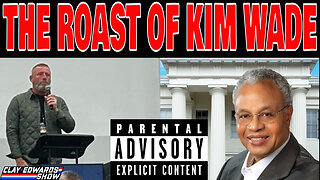Premium Only Content

Hunter's Pardon: A Catalyst for Change in Political Strategy
The video discusses the trends in education and career advancements for women, the readiness for female leadership, the challenges facing female candidates in politics, perceptions of sexism in voting behavior, and the impact of identity politics on personal beliefs.
[103:13-104:19]
Speaker discusses the increasing number of women graduating from college and advancing in careers compared to men.
it's interesting because, like, if you look at all the studies about this, especially now, right now we've got, it's about a 6040 split on women, uh, college graduates versus men. So, 60 percent of women are in college and graduating versus 40 percent of men. That keeps increasing and increasing. Women are getting, uh, you know, graduate degrees at a much higher rate, have more successful careers at higher rates. Anyway, my point by saying that is this. More successful careers in what? Well, they're just, they're advancing in careers, these younger generations, much at a hunch higher rate than men. What kind of, I mean, I, I, Like lawyers, doctors, engineers, that kind of thing. But, but all the other, you know, some, but that's kind of a, that's just a, a BS number there. I mean, that's not a real number. There's a, well, they're doing better this career, but there's a whole other sector of careers that women ain't doing that men are excelling in. Sure, but, okay, if you look at based upon, like, on college graduation rates, look at that. Women are, women are way higher right now. Okay, with that, with that kind of stuff. Way higher rate. Okay, okay. But not, but not overall. Uh, no, I mean, be, well, no, because it's, it would take them a long time to catch up, but I'm saying with the, with the trend we're seeing is that women are graduating college, uh, undergraduate degrees and, and graduate degrees much higher percentage than men are these days.
[104:19-104:51]
Speaker reflects on the preparedness of women for leadership roles, suggesting they are more studious and capable from a younger age.
And, you know, as that continues, that'll, it's gonna flip the script on most of those kinds of careers. The, um, and what I mean by saying all that is that, you know, they've done all these studies about how women are just more studious at a younger age than men, which I think is true, you know. Sure. We're out there drinking and carousing and doing stupid things and women in high school even are finishing their work more and they're just more inept to do those things better than men are. Um, so it's, it's interesting to me that we're not prepared for a woman president because you think women are actually, like, better prepared at a younger age to do better than men naturally and, uh, and we're still like, eh, I don't know, you know?
[104:51-105:29]
Speaker analyzes the challenges the Democratic Party faces in promoting female candidates and the need to stop pressuring voters to support them.
So, I, I find that interesting that women feel that way or at least, you know, anecdotally the ones I've talked to, I just, I think the Democrats are gonna have to accept that overwhelmingly the America ain't ready for a female president and they're gonna have to quit shoving females their voters' throats and telling them that they have to vote for women. And that's the thing they do too, right? Is not only do they put a woman out there, they tell you that you're a chauvinistic pig if you don't vote for her. They, they, they try to shame you into doing it. Yeah, I mean, I did see some of that. Instead of selling the candidates.
[105:55-106:40]
Speaker examines whether lack of support for female candidates is due to sexism, arguing most voters base their choices on the candidates' qualities rather than gender.
Like, like, it's not sexist because, you know, if someone didn't want to vote for somebody, I don't, I don't know, let me put it this way. Do you think anybody sat there? I'm sure there were some, right? But I don't think the majority of people were like, that didn't vote for Kamala Harris, did it because she was a woman. I think there was those people that did it, but Are the women that didn't vote for Donald Trump sexist? Yeah, I mean Are you feminists because you didn't vote for Trump? Let's flip the script. Right, I mean, I, well, I just, I just think that I think there were some people that probably said, okay, I'm not voting for a woman, but I don't think the majority of people that didn't vote for her did it because of that reason. I agree. I think she was a terrible candidate. Yeah, I just, you know, and I think Hillary Clinton said, I mean, you know, you've, you've not had a woman candidate that people have liked. I know, you know, your side, you guys aren't gonna like Michelle Obama, but if you had a Michelle Obama. She's not a woman.
[107:26-107:52]
Corinthian expresses his views on identity politics, stating his belief that women should not hold leadership roles in government.
Corinthian says, as a black man who left the party in 20 16, I was tired of the identity politics, tired of the female preacher, and as an apostolistic Pentecostal, I don't believe women should be the heads of states or governments. And there's a lot of people out there that feel that way. There's a lot of people out there who feel that way. Uh, Corinthian also says, like Sean said, they need to get rid of the identity politics, focus on the values and collective progress. They must broaden appeal.
-
 10:23
10:23
Clay Edwards Show
11 days agoWHITE REDNECK ROASTING BLACK REPUBLICAN (KIM WADE) IN JACKSON, MISSISSIPPI
2411 -
 LIVE
LIVE
Vigilant News Network
9 hours agoEXPOSED: Secret Government Plot to Deploy Aerosolized ‘Vaccines’ Using Drones | Media Blackout
1,960 watching -
 1:13:49
1:13:49
Josh Pate's College Football Show
5 hours ago $0.11 earnedSemifinal Predictions: OhioSt v Texas | Notre Dame v PennSt | Playoff Cinderella | Alabama’s Future
17.7K1 -
 27:56
27:56
The Why Files
1 day agoThe Seventh Experiment: Lacerta Reveals the Truth of our Creation
90.9K56 -
 45:53
45:53
hickok45
16 hours agoSunday Shoot-a-Round # 262
14.3K15 -
 4:52:32
4:52:32
Rotella Games
23 hours agoGrand Theft America - GTA IV | Day 1
61.3K6 -
 8:16:19
8:16:19
Joe Donuts Gaming
16 hours ago🟢Fortnite Live : Chill Vibes Lounge!
81.4K5 -
 38:43
38:43
Standpoint with Gabe Groisman
12 hours agoEp. 63. Terror Strikes the Nova Music Festival. Ofir Amir
149K51 -
 36:04
36:04
Forrest Galante
22 hours agoPrivate Tour of an Indian Billionaire’s Secret Wildlife Rescue Center
117K19 -
 9:37
9:37
Space Ice
1 day agoMorbius Is The Perfect Movie, Everyone Just Lied To You - Best Movie Ever
103K30